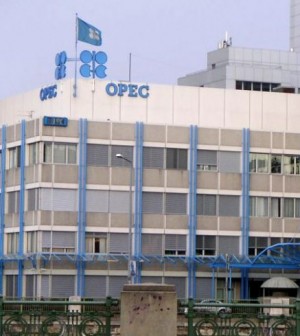Fossil fuel demand will reduce by nearly 25 percent in the next two decades, the Secretary General of the Organisation of Petroleum Exporting Countries (OPEC), Mohammed Sanusi Barkindo has said.
Speaking at the SPE Kuwait Oil & Gas Show and Conference in Kuwait City, yesterday, Barkindo however said fossil fuels will remain a dominant in the global energy mix but in a declining way.
“We see oil as the largest contributing fuel – followed by natural gas, whose share in the energy mix will increase by 2040.”
“Other renewables – wind, solar, geothermal and photovoltaic – are projected to be the fastest growing energy type by far, with their collective share expected to increase by 2040.”
There have been concerns over the shift in global energy mix which may ultimately affects the oil producing nations. Some major consumers of fossil fuels have fixed deadlines to end petrol and diesel engines vehicles in their countries.
For instance, Paris, Copenhagen and Oxford announced bans on petrol and diesel recently. Reports said Paris will ban all petrol- and diesel-fuelled cars by 2030, a decade ahead of France’s 2040 target. Copenhagen plans to ban diesel cars from 2019, while Oxford has proposed banning all non-electric vehicles from its centre from 2020.
Britain also announced ban on all new petrol and diesel cars and vans from 2040. China, the world’s biggest vehicle market, is considering a ban on the production and sale of fossil fuel cars in a major boost to the production of electric vehicles.
Mr Barkindo said by 2020, the fossil fuel demand will declines to below 80%, it would drops further to under 78% by 2030 and reaches 75.4% by 2040.
In contrary, Barkindo said the gas share increases 3.6 percentage pts. by 2040; while the demand increases almost 34 mboe/d (million barrels of oil equivalent per day )and reaches a level of 93 mboe/d by 2040.
“Stability, of course, is the linchpin of these positive medium- and long-term forecasts. In fact, retaining sustainability in market stability beyond 2018 is an absolute prerequisite for investments to be able to cover future oil demand.”
According to him, beyond the forecasts and the positive momentum, there is still the fundamental need to ensure sustainable stability – so that the market does not stall once the necessary stocks are withdrawn.
“The importance of all this is plain to all who are here – and who remember the suffering we experienced during the recent downturn, with a contraction of more than 50% in upstream investments from 2015-2016.”
“This is why our Member Countries continue to invest and maintain their commitment to ensuring healthy supply to meet the world’s energy needs.”
“We need similar commitments on the part of other producers – and need to make sure that the roles and responsibilities that we all share are embraced dutifully and with trust.””
Anything short of this will put our collective efforts at risk – and could undermine the broad and effective implementation that is now successfully underway, he added
[Daily Trust]



















Discussion about this post